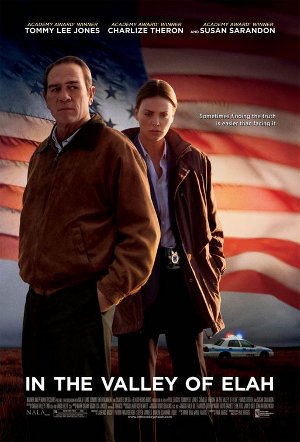- Title: In the Valley of Elah
- IMDb: link


When I saw the trailer to this film I couldn’t get over how much it reminded me of your average Ashley Judd thriller/mystery vehicle (and isn’t it odd how Theron is even made up to like a little like Judd?). Though the film turns out better than I expected, given its marvelous performances, it still gets stuck by the confines of its genre – complete with a head shaking and nonsensical ending.
Former Army Sergeant, and crime scene analyst, Hank Deerfield (Tommy Lee Jones) is informed his son Mike (Jonathan Tucker) is back from Iraq but AWOL from the base.
Hank leaves home and travels down to look for his son but can make no headway in the investigation and tries to enlist the help of a local cop, Detective Emily Sanders (Charlize Theron). Things only get murkier when his son’s burnt and chopped up body parts are found on the side of the road.
Unwilling to let the Army investigate, and most likely hush up the crime, Emily and Hank work together to try and piece together his son’s last few hours and try to understand how and why his life ended in such a brutal act of violence.
The film plays out much like High Crimes, The General’s Daughter, Twisted, Double Jeopardy, and the like, with all the trademark discoveries, twist, turns, and illogical revelations.
What separates the film from those films mentioned above is the time Paul Haggis spends on these characters, each dealing with their own pain and doubts. Emily fights prejudice from her fellow cops who think she slept her way into her job and struggles to raise her young son (Devin Brochu) on her own. In flashbacks Mike deals with doubts and guilt from what he has seen and experienced in Iraq. And Hank and his wife (Susan Sarandon) deal with the loss of their second son to military service. Mike’s friends and fellow soldiers (James Franco, Jake McLaughlin, Mehcad Brooks) mourn the loss as well.
A final note. The film, aside from telling the story, is also a subtle indictment on war, the military, the United States’ presence in Iraq, and what battle does to soldiers. Although I don’t agree or disagree with all the points Haggis makes about soldiers and war in the film, I think many might object to the portrayal of several Army officers which on one side are shown as loyal, caring, and courageous, but on the other hand the same characters are as secretive, egotistical, violent, irrational, immoral and degenerate. Haggis’ idea that war changed them all in the same ways seems a bit simplistic to me, but the idea of war, and prolonged exposures to those conditions, adversely effecting young men and women is a theme worth exploring.
Much like Jodie Foster‘s The Brave One this film tries to balance formulaic action and thrills with strong drama, and much like The Brave One it falls short of its goals. Although the film is worth seeing for its strong performances it never gels the two opposing aspects to come together as a cohesive film. The drama and emotion are constantly undercut by the genre’s reliance on twists and surprises, at times bordering on absurd.
